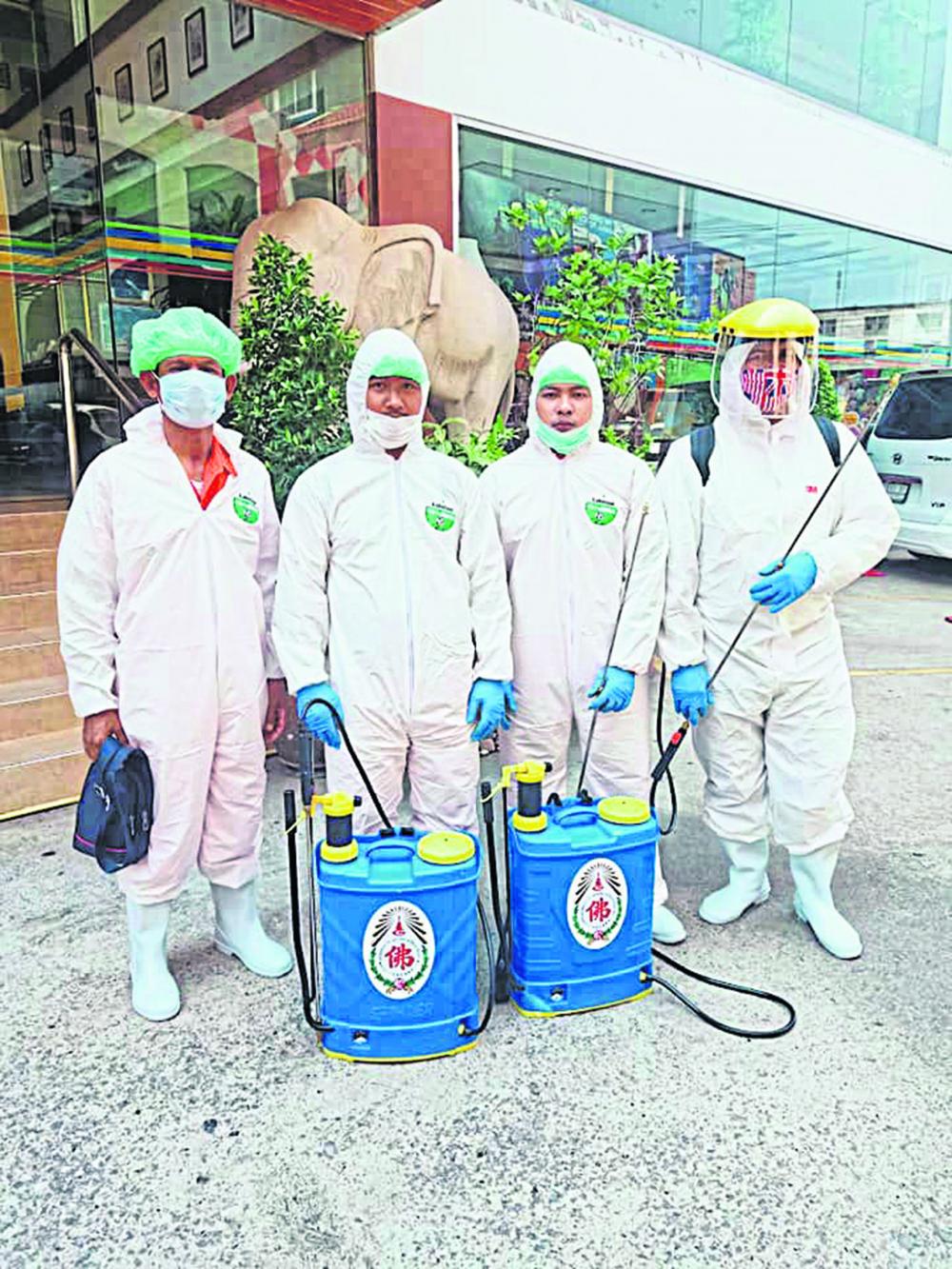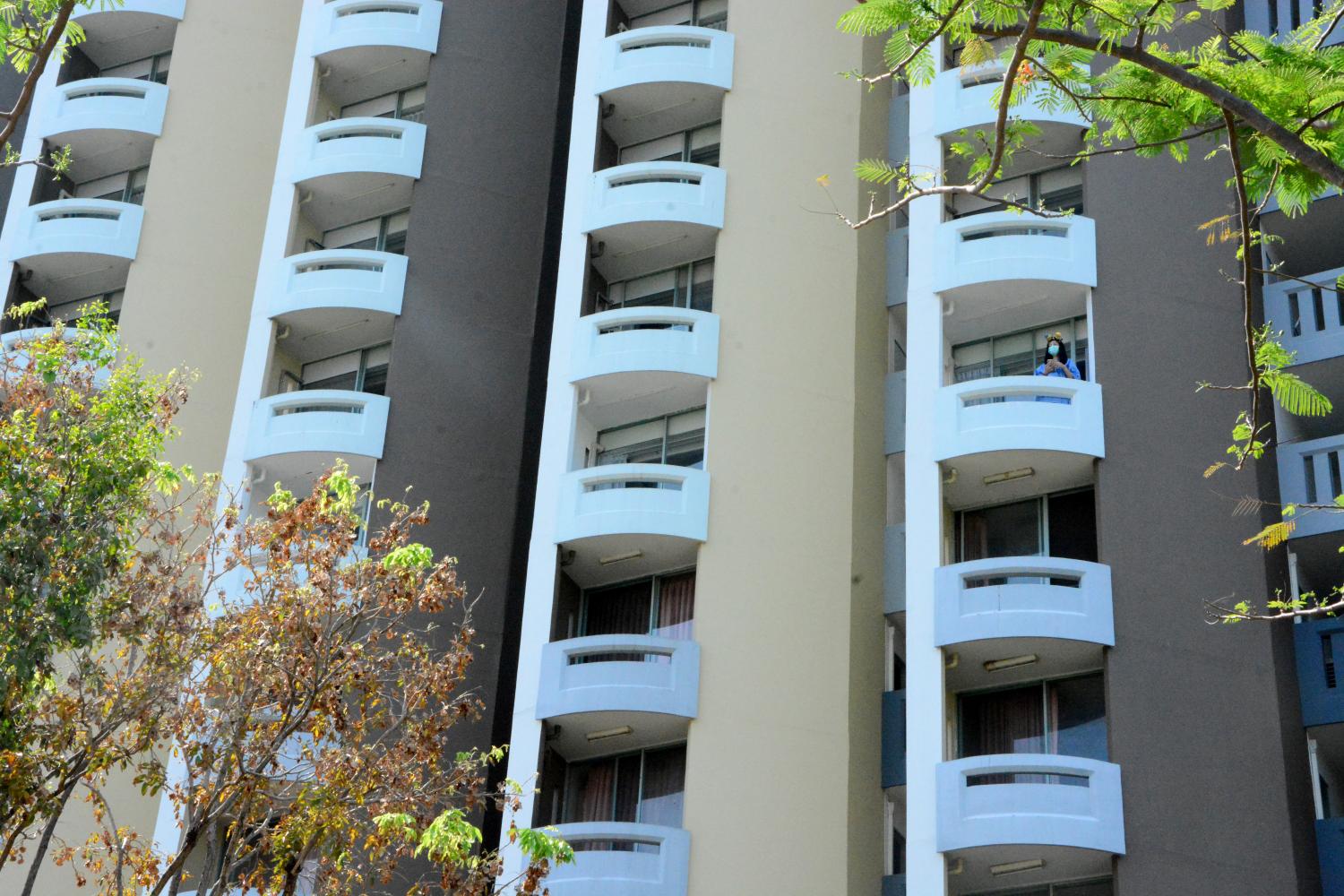
'If Wuhan authorities can build field hospitals with 1,000 beds in 10 days, Korat province can develop field hospitals with several hundred beds in two days," Somchai Chatpathanasiri, owner of the Punjadara Hotel located in Nakhon Ratchasima province, says proudly.
Mr Somchai is one of a number of hotel owners who have offered to allow the Ministry of Public Health to make use of their facilities in the fight against Covid-19.
For instance, two hotels in Phitsanulok province -- La Paloma Hotel and Thep Nakorn Hotel -- have signed up to have their rooms converted into field hospitals, while a number of other hotels and bed and breakfast establishments, such as the Eastin Hotel in Chiang Mai and The Quarter hostel in Bangkok, have offered their rooms for free to medical workers.
On Thursday, Thammasat University Hospital opened its field hospital.
The emergence of this volunteer spirit reflects another side of the crisis. The Covid-19 pandemic has made more than half a million people around the world sick and claimed over 20,000 lives, not to mention drastically changing our way of life in the short term.
Yet, like every crisis, it has also fostered a spirit of compassion and creativity in many communities.

symptom checker: The CoCare app is designed to help people self-quarantine and access medical advice.
In the case of the Punjadara Hotel, the business will offer 80 rooms, if needed, to Maharaja Hospital in Nakhon Ratchasima province to use should the hospital need to draft in extra workers or house at-risk groups.
"At first, people, including my staff were worried about my decision to allow the hotel to be used for medical purposes. However, they backed my decision once I explained we won't be allowing infected patients to stay here. We will be providing extra accommodation for medical staff and people who need to self-quarantine before or after Covid-19 testing," he told the Bangkok Post.
"We do not open our doors to anyone who wishes to self-quarantine. We will accept only cases that are referred here by the Maharaja Hospital," he said.
Mr Somchai said he decided to volunteer his business to help because he believes the healthcare system will soon be overwhelmed.
"Our hospitals do not have the capacity to deal with such a scenario and we cannot let our doctors and nurses fight this war alone. We need to help by offering our space for hospitals to use."
Some medical staff have come to sleep at the hotel after they finish their shifts. Health officials earlier checked over the rooms and gave the establishment a medical-grade deep-clean.
Mr Somchai said one benefit of his decision was that the health authority's inspection had pointed out a few areas where he could improve the service offered to customers in terms of hygiene and safety.

giving it the all-clean: Health officials disinfect Punjadara Hotel to prepare it for the isolation of at-risk people.
For instance, the hotel has now installed CCTV cameras to monitor at-risk people and covered some carpets with synthetic mats for sanitary reasons.
"I still hope the hospital doesn't need to make heavy use of my hotel as that will mean the province is struggling under the weight of the pandemic. But whatever happens, I can now assure guests of the impeccable hygiene standards that our hotel had to meet to offer this help. I believe people will love our hotel," he said.
DORMITORY TO FIELD HOSPITAL
Normally, the Dluxx is a cosy dormitory for athletes at Thammasat University's Rangsit campus in Pathum Thani province.

Bed and breakfast: The Punjadara Hotel in Nakhon Ratchasima has offered 80 rooms to Maharaja Hospital medical staff who are working to contain the Covid-19 epidemic.
However, on Thursday, the university asked over 20 tenants to move elsewhere to allow it to covert 308 rooms into what it is calling the Thammasat Field Hospital for Covid-19.
Chatchai Mingmalaikul, director of the project, said the Dluxx has been adapted to absorb patients with mild cases or who have recovered but still need monitoring.
The main hospitals, he said, are trying to establish field hospitals to accommodate the 80% of Covid-19 patients who only suffer mild symptoms from the disease.
"Only 20% of patients are serious cases that need to stay at hospitals and use ventilators," he said.
At Dluxx, each patient will be assigned to one room. There will be three meals served, plus a strong wifi signal for patients to stay in contact with friends and family and keep themselves amused.
"We will try to make them cosy as they need to stay in the room 24 hours a day until they are confirmed negative for Covid-19," said Dr Chatchai, adding that patients will have to wash their own clothes and bedsheets as part of the quarantine process.
CREATIVE QUARANTINING
The fight against Covid-19 requires more than just medical treatment at hospitals.
One of the cornerstones of limiting the spread of the virus, or "flattening the curve" as experts have called it, is an effective self-quarantine policy.

Doors open: The first Covid-19 patient from Thammasat University Hospital yesterday moved into the new makeshift field hospital.
Some healthcare experts in Western nations have even suggested that patients with mild symptoms should not visit a hospital unless their condition takes a turn for the worse.
What may seem to some like a heartless strategy is in fact a crucial tactic to prevent healthcare systems being stretched to the point of collapse. It is intended to help keep the healthcare system from collapse.
"The fact is that only 20% of cases require hospital admission," said Kongkiat Kespechara, CEO Group 3, Bangkok Dusit Medical Services.
"The challenge is how to deter every patient from coming to a hospital, which could overwhelm our healthcare service. Our limited beds, ventilators, medical supplies and resources must be directed towards serious cases," said Dr Kongkiat, who also runs a company which develops software to assist medical treatment.
On March 19, Dr Kongkiat launched an online self-quarantine portal called "CoCare", which seeks to ease the burden on doctors and hospitals by helping at-risk groups undertake at-home quarantine.

technology aid: App Cocare, online platform for medical volunteers to help self-quarantining Covid-19 patients can help ease the burden on the healthcare system.
The service is recruiting volunteers from the medical profession as well as the public, to assist patients under quarantine. Those who are interested can visit https://cocare.opensource-technology.com
"It is almost impossible for patients to call a doctor and have a one-on-one conversation because our healthcare resources are almost on their last legs. But patients can receive medical advice via this online platform and app," said Dr Kongkiat.
The app provides a dashboard feature that allows medical staff to monitor many cases at a time, rather than having to access patient records individually.
A number of hospitals under the Bangkok Metropolitan Administration and some private hospitals have already begun to integrate the app into their self-quarantine protocols for monitoring at-risk individuals and groups.
The app also allows the public to volunteer their help with things such as delivering groceries or medicines to people who can't leave home for 14 days.
"The app is designed to provide reassurance to people who have been told to stay at home. For many, this is the first time they've been told they can't leave their houses, so we're hoping this can be a lifeline that prevents them from panicking," said Dr Kongkiat.
He added that "outbreaks always have their own patterns" and stemming the tide is about more than just treating the sick.
"Epidemiologists must try to predict the course of the outbreak, such as when infections will peak and the estimated number of patients over a given period of time.
"We might not be able to change the past, but we can determine the course of the future by using strategies such as social distancing and home quarantine to reduce and ultimately eliminate domestic transmission rates," he said.